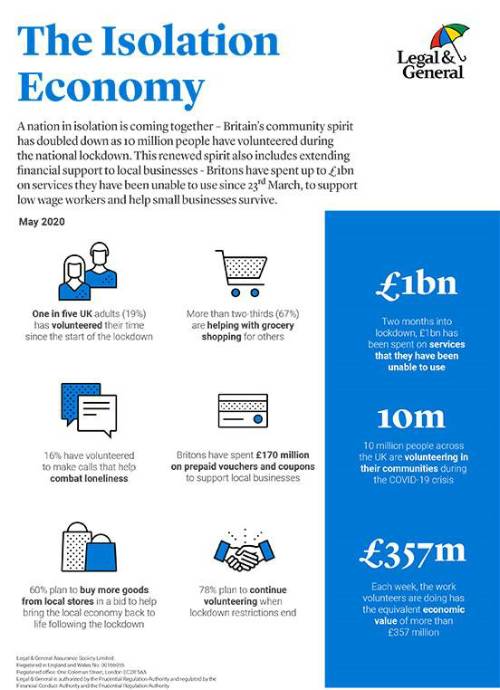Britons are volunteering in their millions as part of the ‘isolation economy’, according to new figures from Legal & General and Cebr. The latest wave of the FTSE100 financial services group’s Isolation Economy research has found that 10 million UK adults are serving as an informal ‘volunteering army’, supporting local communities and helping vulnerable people. Each week, the work these volunteers are doing has an equivalent economic value of more than £357 million, according to the Isolation Economy research, with each individual contributing on average three hours of their time.

Volunteering in the crisis
According to the Isolation Economy study, one in every five UK adults (19%) has volunteered their time for community-level activities or organisations since the start of the lockdown on March 23rd. This includes nearly a quarter (23%) of furloughed workers.
Royal Voluntary Service has been leading the volunteering efforts in response to the Coronavirus crisis. The charity has been working together with its corporate partner Legal & General, with employees of the FTSE100 company taking part in volunteering efforts including making phone calls to check in on vulnerable individuals.
67% of volunteers are helping with grocery shopping for others and a quarter (26%) have collected and delivered medicines or prescriptions. 16% of those donating their time have volunteered to make calls to people in a bid to combat loneliness. All of this activity is separate to the actions of those people serving in the formal NHS volunteer programme.
Across the generational divide, people are coming together to give up their time and help those in need, according to the Isolation Economy research. More than a fifth (22%) of those aged between 35 and 54 were volunteering for instance, as are 18% of over-55s. Millennials, while the least likely to volunteer (17%), gave up the most time – an average of 3.5 hours a week on grocery shopping and 4.4 hours if volunteering in other ways. Almost a third (29%) of UK adults believe that the younger generations have taken on more responsibility during the lockdown to support their parents and grandparents.
This spirit of supporting others is more than a short-term trend. More than three-quarters (78%) of those volunteering plan to continue helping those in need after the lockdown.
Bringing communities together
Community ties have also strengthened under the lockdown. The Isolation Economy research also reveals that two-thirds (64%) of UK adults feel their communities have ‘come together to help each other’ during the crisis.
This renewed community spirit includes extending financial support to local businesses. Families have tried to help those that help them, continuing to pay cleaners, gardeners and other workers for services they knew they would never be able to use under lockdown. £637 million was spent on unused goods and services between the start of the lockdown on 23rd March and the end of April – a figure that has now risen to more than £1 billion two months into lockdown. UK adults have spent £170 million on prepaid vouchers and coupons and 60% plan to buy more goods from local stores in a bid to help local economies following the lockdown.
Legal & General is also extending its support for volunteering and charitable work amidst the crisis. The FTSE100 group has substantially raised its cap on matching funding for any activities where its employees are raising funds or donating their time for COVID-19 causes. The change marks a ten-fold increase in donations from L&G.
Legal & General’s Isolation Economy research previously revealed a significant shift in consumer spending habits, giving ‘at-home’ spending a boost equivalent to an £12.9bn annually. This change is largely a result of UK adults’ increased expenditure on four key “at home” categories during the lockdown: groceries, alcohol, entertainment and hobbies & crafts.
Being more isolated has made us also more inclusive. Britain’s community spirit has doubled down in lockdown, forging an informal army of volunteers who are now a key part of our national infrastructure in the crisis. Individuals and families have come together and created new ties across communities, cutting across age, income and circumstances.
We have become a nation of volunteers during the COVID crisis. And - judging by the millions who plan to continue after the lockdown - it is a change that is here to stay.
Nigel Wilson CEO at Legal & General: Coronavirus has changed our behaviour and our priorities. More of us are giving up our time and savings to support local communities and businesses. People are paying for services they knew they would never be able to use due to the lockdown – but which made a difference to people’s lives and finances. These generous, vital gestures make a positive difference to the lives of others in the isolation economy.
Sam Ward Director of Services and Deputy CEO for Royal Voluntary Service: As restrictions ease for some, many older and vulnerable people will remain isolating at home, in desperate need of practical support, mental stimulation and companionship. Royal Voluntary Service has mobilised to respond to Coronavirus through a massive, co-ordinated volunteer effort. The public response has been a beacon of hope during this crisis with legions of people stepping forward to volunteer and help others. Our volunteer army is needed more than ever before to meet the need older people continue to face now, and over the coming months as they try to re-build their lives.
|

